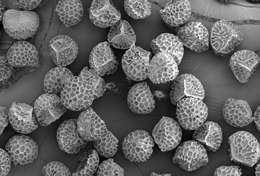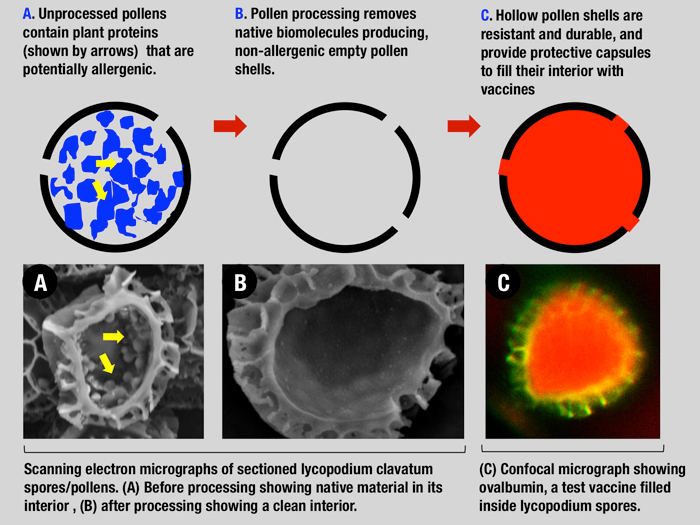Dr. Harvinder Singh Gill Awarded Five-Year, $2.2M Grant from the National Institutes of Health
By Jeff Sammons

Dr. Harvinder Singh Gill, an assistant professor of chemical engineering, was awarded a five-year, $2.2M grant from the National Institutes of Health for his proposal, "Pollen Grains as Trojan Horses for Oral Vaccination." The grant, known as the NIH Director's New Innovator Award, is given to support exceptionally creative new investigators who propose highly innovative projects that have the potential for unusually high impact.
Gill's research will develop pollen grains as a novel system for oral vaccination, which could lead to improved, painless, and edible vaccines in the future. Gill is one of fifty-one researchers that are receiving New Innovator awards to pursue visionary science that exhibits the potential to transform scientific fields and speed the translation of research into improved health, under the High Risk High Reward program supported by the National Institutes of Health Common Fund.
This NIH award is following a recent Defense Advanced Research Projects Agency (DARPA) Young Faculty Award (2012) to investigate pollens as a unique platform for oral vaccination. Together, the NIH New Innovator Award and the DARPA Young Faculty Award will enable Gill to understand, engineer, and test the pollen grain-based oral vaccination platform.
The NIH award will fund an array of experiments, including the testing of the vaccinations in a pre-clinical setting with animals.
Gill initially hypothesized that if he could remove offending and allergic reaction-causing proteins and fats present in pollen grains, he could reveal a natural empty shell and create a delivery method with very unique properties. He conducted several experiments with lycopodium clavatum spores, removing the spores' native proteins and fats, and filling them with ovalbumin as a model protein vaccine. Once consumed, the shells were able to withstand the acidic and digestive environment of the stomach and traveled to the intestines. As he predicted, the grains helped produce excellent immune responses in mice against ovalbumin.

Through this award, Gill hopes to fully understand the mechanisms and concepts of how pollen grains help to induce a strong immune response.
Beginning with lycopodium clavatum, he will attempt to gain a mechanistic understanding of how the grains are able to withstand the harsh environment of the stomach and intestines, and like the Trojan Horse of history, pass through the body's defenses without much impediment. Eventually, he will expand the repertoire of pollen grains to include other species of pollen grains, perhaps identifying characteristics of certain species that may have better or different effects.
The mechanistic analysis will include a biodistribution component and a histopathological component.
For the biodistribution analysis, Gill will initiate a study in mice using biofluorescence techniques and a confocal microscope. He will "follow" the vaccine-filled grains and the particles through the body and the intestines, keeping track of the timing and rates that the grains pass through the body. This will provide a system-wide inventory of the body's reaction to the grains, how quickly immune responses can be generated, and the fate of the grains.
In a histopathological analysis, he will identify the immunological cells that are exposed to the vaccine-filled pollen grains and how they are being activated.
The goal is also to fully understand the range of immune responses that can be produced.
Through initial testing, Gill knows that vaccine-filled pollen grains can produce a good systemic immune response in the body. However, because pollen grains are being given orally, the body has the potential to produce mucosal immunity. This could lead to the generation of antibodies in the intestines or in other mucosal regions such as saliva or reproductive areas, something that does not normally happen with traditional intramuscular vaccinations. He will test blood, saliva, and fecal droppings before and after the exposure to measure antibodies and, in some cases, the cytotoxic T-cell production. Mucosal immunity generates a first line of defense on the mucosal surfaces to prevent the entry of pathogens into the body.
In addition to helping the vaccines get into the body, the pollen grains may also hold the key to creating a stronger immune response in a way that is not currently possible through the oral route. The pollen grains' "Trojan Horse" properties, may allow them to carry other components into the body. The grains could be used to transport a vaccine and an adjuvant into the body. Adjuvants are molecules or chemicals that stimulate the immune response. Adjuvants are often destroyed in the stomach when they are taken orally. Gill will test known, but safe, adjuvants that do not normally have a strong immune response when given orally. Through the grains' ability to infiltrate the body's defenses, these adjuvants could be successfully administered at the same time as the vaccine. This could lead to a synergistically improved immune response.
Overall, the potential for this vaccine delivery system is significant. Pollen grains may be a revolutionary way to provide a cheap, convenient, and painless path for vaccinations to be delivered into the body and provide excellent systemic immunity and a potent mucosal first line of defense.
Gill joined the Department of Chemical Engineering at Texas Tech in 2009. He received a Ph.D. in Bioengineering from Georgia Institute of Technology and has completed post-doctoral work in microbiology and immunology at Emory University. Gill has also received numerous honors and awards, including the Sigma Xi Best Thesis Award for his thesis at Georgia Tech in 2008, the Best Doctoral Paper Award at the Science Applications International Cooperation (SAIC) in 2008, and the Dr. Charles Burford Faculty Award at Texas Tech University in 2011.

Edward E. Whitacre Jr. College of Engineering
-
Address
100 Engineering Center Box 43103 Lubbock, Texas 79409-3103 -
Phone
806.742.3451 -
Email
webmaster.coe@ttu.edu
